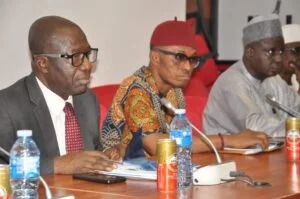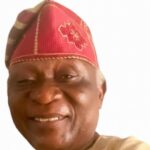It’s truly nice to engage scholars at the 4th Annual International Conference of Management and Social Sciences Researchers of Nigeria for two days at the Imo State University, starting on September 3, 2025. Quite enlightening and enriching. Not to forget new friends I have made from different places!
When I was chairing the conference yesterday, I pointed out that it’s pretty odd that all presentations were based on quantitative research. Not even one person made a reference to qualitative research!
Yet, we know that research is not just quantitative, but can also be qualitative. There is even the mixed methods approach. Why didn’t any person refer to the qualitative technique or mixed methods at all?
While most people participants seem to glamorize quantitative research, it is appropriate to bear in mind that there are serious issues with it. Two days ago, Dr Iheanyi Anyahara who used to work for the Financial Reporting Council of Nigeria, in his excellent presentation reminded us that numerical data and statistical analysis are no longer enough. The social issues and the processes leading to these figures need to be established convincingly. This is in line with current thinking and practice worldwide.
One of the major problems with quantitative analysis is that it doesn’t provide information on why a phenomenon occurs. It just tells you that it takes place. The scant information has serious consequences. A scholar should know why the phenomenon happens. A scholar isn’t a technician!
Quantitative research doesn’t make for theory generation or development. Because the data it provides isn’t in-depth, it is difficult to build a theory on it.
Quantitative research doesn’t capture human emotions. Figures don’t tell or reveal to you how humans feel on a given issue. To say that a certain percentage of Nigerians are poor, for instance, doesn’t carry the weight of poverty well as singling out a person or two and describing in detail how they can’t afford basic medical treatment, eat or send their children to primary school. A lot of issues need to be conveyed with dramatic force.
Number crunching can sometimes be misleading. Robert McNamara, who was to become the World Bank president in April 1968, performed not so brilliantly as the American Secretary of Defence in the early 1960s as a result of his conduct of the war with Vietnam. He was preoccupied with statistics, not human emotions and strategy and tactics. As a result, the war became extremely unpopular, dividing Americans whose soldiers were returning home in large numbers in body bags. There were sustained street protests against the war.
McNamara was a brilliant student at the University of California at Berkeley and at Harvard Business School where he was famous for number crunching. He also excelled at Ford Motors, but in government he went too far with his obsession with numbers. His experience should be a lesson to all of us.
Data integrity is a crucial question particularly in quantitative research. It is vulnerable to what has been identified as data sycophancy. Authorities in the private sector and in the public sector manipulate statistics. Donald Trump last month removed the American in-charge of labour statistics, accusing her of manipulating the unemployment figures against his government. In 2008, the Argentine government fired the statistician general and replaced him with someone who was providing figures that the international community, including the World Bank and the IMF, rejected. The rejection had grave consequences for the economy.
Here in Nigeria, Bunmi Oni, the Cadbury MD, and Rufus Giwa, the Lever Brothers MD, were removed for manipulating statistics about their companies.
Quantitative research is frequently an example of “garbage in, garbage out”. It doesn’t give you the opportunity to probe and interrogate claims, unlike, say, the in-depth interview technique in qualitative research.
Recognizing the inadequacies of quantitative research is critical in our work, as in acknowledging the strengths and weaknesses of the qualitative approach and the mixed methods. Such recignition makes for penetrating and balanced scholarship.
As I reflect further on the two-day 4th International Conference of Management and Social Sciences Researchers of Nigeria held at the Imo State University at Owerri, there are three things I would like to discuss briefly. The first is to reiterate that the emphasis in today’s social science scholarship is on stakeholders, and no longer on stockholders or shareholders.
Gone are the days when Milton Friedman, the monetarist at the University of Chicago, Nobel Prize laureate in economics and the most influential monetary economist in the last 50 years, would declare that businesses exist purely to make profits, that is, for their shareholders. Stakeholders, as we noted on the second day of the conference, are the stockholders plus organizational members otherwise called employees or the staff, the host community, suppliers, distributors, and the government.
It is important to reiterate this point because after the attention of the lady who presented a paper on the United Bank of Africa (UBA) was called to the need to replace shareholders with stakeholders in her work, another presenter gave the impression that only shareholders are the stakeholders in an organization. The “UBA lady” stated that the bank’s audited report would be of critical importance to the shareholders. But the audit report would be equally of great importance to UBA employees, the CBN, the NDIC, UBA consultants, the government, etc.
Now, the second observation. None of the second day presentations regrettably is as strong theoretically or philosophically as it should be. Theory is of great importance to academics. Theory must be reflected clearly in research methodology which in Nigerian universities constitutes Chapter Three in dissertations.
There is a philosophical framework which guides research methodology, starting from research design, if not the research question because how a research question is framed in qualitative research is different from how it is framed in qualitative research. There are traditions in research methodology that need to be respected. Exploratory design goes with qualitative research, social constructionism, and inductive reasoning in the approach to theory. Quantitative research goes with explanatory design, positivism, and deductive reasoning. The mixed methods have their own research protocol, with abductive reasoning as its approach to theory.
I didn’t hear a reference made to any of the research protocols. Yet, this is at the heart of modern research, whether in management science in particular or social sciences in general.
There is a lot of material free of charge online from one of the two management research books I recommended two days ago, namely, Research Methods for Business Students, 9th edition, by Saunders, Lewis, and Thornhill (2023). We can also learn more, free of charge, from ChatGPT or any other large language model (LLM). Needless to say, there are numerous free academic and professional articles online on the topics touched here.
My third point is how to make the next conferences more interactive. Like most participants, I would like a situation where from the first day an ample opportunity is given to critique or review every paper immediately after presentation.
It’s been so good engaging a number of participants since the conference ended. May God bless everyone abundantly.
I look forward to the day Nigerian business programmes, especially with the establishment of management schools at Unilag, UNN, Unizik and BUK, would earn accreditations from AMBAs, AACSB, and EQUIS. Many of you would be wondering: what are these things? Please, Google them. It is extremely important that you do as a business scholar.
I would like to end my reflection on the 4th International Conference of the Association of Management and Social Sciences Researchers of Nigeria last week at the Imo State University by touching briefly on two related issues: the need for academic diversity at future conferences of the association and the multidisciplinary nature of management science.
There are benefits of being a participant observer like me. There are good insights which only observers or outsiders can offer. The etic (outsider) and emit (insider) debate that raged till the early 1970s among linguists, psychologists, sociologists and business researchers comes to mind.
I was very excited to learn from the AMSSRN founder and president that there is in Nigeria an association that brings management scholars and other social science researchers together.
I was excited because in Nigeria there is a wide chasm between management science and other social sciences probably because they belong to different faculties or schools in our universities. In fact, most Nigerian social science scholars don’t even know that management is part of the social science school. This is quite surprising especially in this era of interdisciplinarity.
I asked a sceptical head of the mass communication department of a university if mass communication would no longer be considered a social science with the NUC unbundling it and the discipline becoming a faculty or school rather than just a department. She then began to see things differently. In Nigeria, there is limited interaction or communication between one school or another despite all the talk about a multidisciplinary approach to issues. Each school is a kind of silo.
Therefore, it’s delightful to see a team of Nigerian scholars who recognize that management science is a social science and they have an umbrella organization called the Association of Management and Social Sciences Researchers of Nigeria ( AMSSRN).
The 4th conference was dominated by accountants. It’s understandable. It’s founder and president is a full accounting professor and a Fellow of the Institute of Chartered Accountants of Nigeria (I CAN). However, we hope to see people from political science, sociology, economics, anthropology, mass communication, and psychology at future conferences. Let the AMSSRN reflect the beautiful diversity in its name.
When some people wonder if philosophy should be part of a management student’s thesis, they usually receive the explanation that business leaders manage across functions because of the multifaceted nature of every business. An accountant may be the CEO of an organization, but he or she must deal with folks on the HR Team, PR Team, Engineering Team, IT Team, etc. A CEO is a general general manager, or a genralist, as he or she is referred to in the intellectual literature.
Management science is perhaps the most diverse academic discipline. And this may be one major reason why it has remained the fastest-growing discipline in the world since the 1960s.
It started a little over 100 years ago in the United States with experts who had backgrounds in mathematics, statistics, economics, psychology, anthropology, accounting, etc. Many participants in the famous Master of Business Administration (MBA) programmes in different business schools across the globe studied engineering, medicine, journalism, mass comm, IT, history, etc, and they bring their knowledge to enrich the programmes. Many have ended up as academics in management schools and they contribute significantly to training and even theory. Some people tend to forget that Geert Hofstede and many other famous management theorists studied engineering before joining management schools. Condolezza Rice, the former international relations professor at Stanford University before she became the National Security Adviser and later the Secretary of State under President George Bush, Jnr, has since returned to Stanford but is now in the Stanford University Graduate School of Business.
Let us continue to honour the academic diversity of the Association of Management and Social Sciences Researchers of Nigeria and the heterogenous nature of management science.
It’s been a good experience to associate with you since last week.
Follow us on all social media platforms @dailyquery for news and analyses around the globe.


























